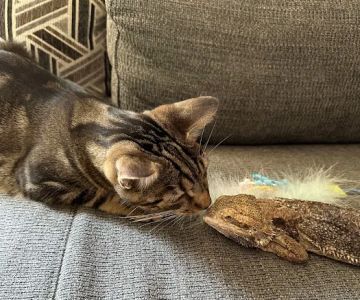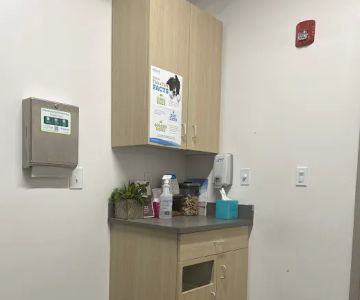Maintaining Your Pet's Dental Health
As a pet owner, one of the most important responsibilities is ensuring the overall health and well-being of your furry friends. While we often focus on feeding, exercise, and grooming, there's one crucial aspect that often gets overlooked: dental health. I’ve learned the importance of maintaining my pets' dental health firsthand, and it's something I want to share with you.

9 Coffman Ave, Malvern, PA 19355, USA
See Details1. Why Pet Dental Health Is So Important
Dental health is critical not just for humans, but for pets as well. Just like us, pets can suffer from a variety of dental issues like plaque buildup, gum disease, and tooth loss. These problems can lead to pain, difficulty eating, and even more serious health complications, such as infections that affect their organs.
1.1 The Consequences of Neglecting Pet Dental Health
Neglecting your pet’s dental care can result in serious health issues. I recall when my dog started having trouble eating, and I thought it was just due to age. But after a visit to the vet, I learned that dental issues like gum disease were the culprits. Left untreated, dental issues can cause not only pain but also bacterial infections that could spread to vital organs like the heart, kidneys, and liver. So keeping their teeth clean is much more than just an aesthetic issue—it's a matter of their overall health.
2. The Basics of Pet Dental Care
Now that we understand why dental care is important, let’s talk about how to take care of your pet’s teeth. It’s not as complicated as it seems, but it does require consistency and the right approach. Based on my own experience and veterinary advice, here are the essential steps to maintaining your pet’s dental health.
2.1 Brushing Your Pet’s Teeth
Brushing your pet’s teeth might sound daunting, but it’s one of the most effective ways to prevent plaque buildup. When I first started brushing my dog’s teeth, I thought it would be a challenge, but with the right tools and patience, it became part of our routine. Use a toothbrush designed specifically for pets and a pet-friendly toothpaste (never use human toothpaste!). Start by gently massaging their gums and teeth to get them used to the sensation, and gradually work your way into a full brushing session. Aim to brush their teeth at least three times a week for optimal results.
2.2 Using Dental Chews and Toys
Another great way to support your pet’s dental health is through dental chews and toys. Many pet stores offer a variety of chew toys and treats that help clean teeth while your pet enjoys chewing. These products are designed to reduce plaque and tartar buildup and keep their teeth strong. I’ve found that these dental chews work wonders as a supplement to regular brushing. Plus, it’s a fun and engaging way for pets to take care of their teeth.
3. Regular Vet Checkups and Professional Cleanings
While home care is vital, it’s also important to schedule regular vet checkups to monitor your pet’s dental health. Most vets will check your pet’s teeth during their annual exams. If necessary, they may recommend a professional dental cleaning, which involves scaling the teeth to remove plaque and tartar buildup that can’t be removed with a brush.
3.1 The Importance of Professional Cleanings
In my experience, professional cleanings have been crucial for keeping my pet’s teeth in top condition. After a cleaning session at the vet, I always notice a huge improvement in their breath and overall comfort. It’s important to remember that while regular brushing can prevent a lot of issues, professional cleanings are essential to ensure that no hidden problems, like gum disease, go unnoticed.
3.2 Signs of Dental Issues to Watch For
It’s essential to be vigilant about any changes in your pet’s behavior, as they can be signs of dental problems. Some signs that might indicate your pet has dental issues include bad breath, difficulty chewing, drooling, red or swollen gums, and a decrease in appetite. If you notice any of these symptoms, it’s time to schedule a vet visit to assess the situation and determine the best course of action.
4. Dental Diets and Supplements
Another helpful approach to maintaining your pet’s dental health is through their diet. Some pet foods are specifically formulated to help clean teeth and reduce plaque buildup. Additionally, dental supplements like water additives or chewable tablets can help improve your pet’s oral hygiene. These are great additions to your pet’s daily routine, especially if your pet isn’t too fond of having their teeth brushed.
4.1 Dental Foods and Treats
There are several dental diets available that are designed to reduce plaque and tartar buildup. These foods typically have a larger kibble size or a special texture that encourages chewing, which helps clean the teeth. I’ve used dental treats with my dog to great effect. They are easy to give and can be a fun part of your pet’s routine, all while helping to maintain good dental hygiene.
5. Dental Care for Different Types of Pets
While dogs and cats are the most common pets, each type of pet may have different dental care needs. For example, smaller dog breeds tend to have more dental problems due to their smaller mouths and crowded teeth. Cats, on the other hand, are more prone to gum disease, which can go unnoticed unless closely monitored. It’s important to adjust your dental care routine based on your pet’s species, breed, and specific needs.
5.1 Dental Care for Cats
Cat dental care is just as important as dog dental care, though cats are often less cooperative when it comes to brushing. If your cat isn’t used to having their teeth brushed, you may need to start slow and use a finger toothbrush or a specially designed cat toothbrush. There are also dental treats for cats, as well as special food formulated to help with dental health. It’s always a good idea to schedule annual checkups to monitor your cat’s teeth and address any issues early on.
6. Preventing Future Dental Issues
The best way to ensure long-term dental health for your pets is prevention. This means consistently following a dental care routine and being proactive about any changes in your pet’s mouth or behavior. Regular brushing, dental chews, vet checkups, and professional cleanings are all essential parts of a successful dental care plan. By maintaining these habits, you can help your pet live a long, healthy life with a happy, pain-free smile!










